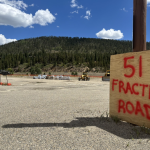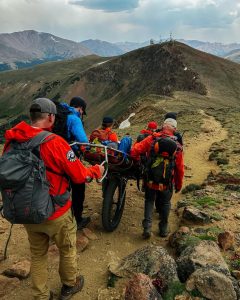Local hotel to be converted into workforce housing in a collaboration between Summit County, Breckenridge

David Rossi/Courtesy photo
A 1961 hotel on the outskirts of Breckenridge will be converted into 38 workforce housing units following the purchase of the property by Summit County government and the town of Breckenridge.
Breckenridge and the county acquired the hotel in a 50-50 negotiation, each contributing $3 million to the $6 million expense.
The LOGE Hotel is located in unincorporated Summit County on Tiger Road. According to Summit County Housing Director Jason Dietz, the units will be available as soon as this fall. It is too early to determine the price of rent, Dietz said.
While the hotel itself may need some work such as fixing light fixtures, updating bathroom fans and preparing the heating system for winter, providing immediate housing to the community is of the utmost importance, said Breckenridge housing manager Laurie Best.
“I think, you know, the strain and the stress on our housing inventory today is unlike it’s ever been,” Best said.
The rise of short-term rentals in Summit County has led to a situation where visitors are staying in areas where long-term residents have traditionally lived, and the rise of hotel conversions for workforce housing have put many residents in buildings that were once built for short-term occupancy.
In the past year, both the Alpine Inn in Frisco and the Days Inn in Silverthorne have, combined, created almost 100 more units for Summit County’s local workforce.
Best said the LOGE Hotel entered the pool of options for Breckenridge’s housing department multiple times. The department repeatedly turned it down, but this year they made the leap.
“When we have the opportunity to acquire 38 units at a good price per unit … that’s not an opportunity that we’re going to pass up,” Best said.
Best added that while the hotel may seem like it had a hefty price tag, the acquisition of existing housing units makes this a feasible and reasonably priced project.
“It is a lot of money, but if you look at what it costs us to build new units, (or) to convert existing inventory to deed restricted inventory, it’s much higher than the acquisition cost here per unit,” Best said.
She explained that to build new units on vacant land would cost more than roughly $400,000 each. Therefore, to build 38 of them would cost around $15 million.
These units are still hotel rooms, however. Dietz added that there are no kitchens within the rooms, so a communal kitchen will be available for all residents. Efforts will also be made to allow for hot plates within the units.
Other renovations are necessary, but Best said the location of the hotel is one reason they couldn’t pass up the opportunity.
The hotel is close to a bus stop and surrounded by other workforce housing and residential areas. It also has access to trails and even has good views, Best added.
However, Best said the property itself has some capacity to be something more. Once zoning is adjusted and the building is converted from well and septic to town water and sewer, the 1.8-acre site has potential, Dietz said.
Both Dietz and Best estimated that at some point in the future, the property could be redeveloped to a multistory apartment complex.
While a hotel may not be the ideal housing situation for many, Best said the current housing market leaves people wanting for an individual unit, an opportunity she is excited to offer locals in the community.
“It’s super important to both the town and the county to have a diversity of housing stock,” Best said. “I think the LOGE certainly provides housing that’s going to fit the demographic.”

Support Local Journalism

Support Local Journalism
As a Summit Daily News reader, you make our work possible.
Summit Daily is embarking on a multiyear project to digitize its archives going back to 1989 and make them available to the public in partnership with the Colorado Historic Newspapers Collection. The full project is expected to cost about $165,000. All donations made in 2023 will go directly toward this project.
Every contribution, no matter the size, will make a difference.










